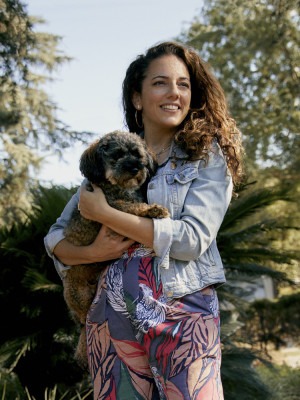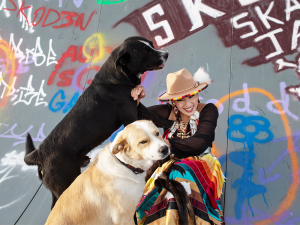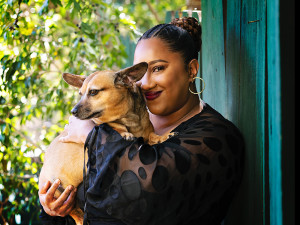Moisés Zamora Has a League of Superhero Cats at Home
The award-winning writer-producer-filmmaker’s superpower is rescuing cats — and letting them inspire the virtual worlds he creates.
Award-winning writer-producer-filmmaker Moisés Zamora is most recognized as the creator of Netflix’s Selena: The Series (2020). But before that, he was, like many Americans, an immigrant who arrived Stateside with his family, looking for a better life. Once an animal-loving kid back in Mexico, the stress of being an immigrant caused him to swear off pets. In fact, he actively avoided them.
That all changed with the pandemic, when he and his boyfriend took in a kitten, which opened the floodgates to fostering many, many more kittens. He even retrofitted his house to accommodate its feline occupants.
The pandemic, and subsequent weakened economy, has been stressful for many in the entertainment industry. But for Zamora, it was also an emotional and contemplative time. Over the past few years, he and his boyfriend have managed to rescue several sick kittens. At the same time, Zamora was co-founding Astrolucha, a Latinx-focused, Blockchain-driven production companyopens in new tab, and scripting/developing a pair of potential TV series: Off the Rims, which he describes as “The Fast and the Furious meets Atlanta,” and Whistleblower, about a real-life female soldier mysteriously murdered in 2020. Still, that didn’t stop him from rearranging his professional life to make sure his kittens got the care they need.
Kinship spoke with Zamora about his experience rediscovering the healing power of pets, and how they’ve inspired Astroluchaopens in new tab, a diverse league of superheroes — which includes cats.
How much do you spend on your pet per year?
What was life like in Mexico, where you were raised?
I was born in Mexico and came to the United States as a result of my family trying to start anew, to give us a better future. We grew up in a beautiful small town in rural Mexico [El Limón Jalisco], so I was always surrounded with animals. We had several dogs. One, in particular, was given to me when I was very little. I will never forget leaving the car, pulling away from our front entrance, where my great-grandaunts were waving goodbye. I was 11 years old and knew very deeply that was the last time I was going to see them because they were older. I also had to leave my dog behind. It took us about five or six years to get all of our immigrant statuses in place because we were green card holders.
Did you have a new pet when you got to the States?
Eventually, we settled in central California and had land with a lot of animals, including cattle and goats and chickens. It’s something that we always loved. But I did not want to get emotionally attached to anything else because it was too heartbreaking. We had a lot of dogs and we even had cats, but I would detach myself from them.
But now?
The pandemic opened [me] up a lot! I mean, I had already been working with a therapist working through a lot of stuff that was left over from immigrating to a country being BIPOC, and realizing that there’s racism, prejudice, and you’re always fighting to explain yourself and that you belong here. In addition to that: coming out with my sexuality and dealing with a very conservative family. I’m also 11 years sober. And one of the things that showed up in my latest relationship is that my partner had a cat named Masha.
How did you start rescuing kittens?
There’s this great organization called Kitten Rescueopens in new tab. They put kittens through a process to get them ready for adoption. So they vaccinate them, quarantine, everything that comes with it. By month four, they’re also socialized. I put in an application for Pepito. Pepito is the Spanish name for a little kid, kind of a “Dennis the Menace.” He was full of energy, and his face was lovely, a black-and-white body, you know, kind of a tuxedo.
How was Masha with Pepito?
Masha and Pepito do not get along! She went on a three-day hunger strike. She was so angry. We put Pepito in the bathroom first, so they could see each other. And she would pass by and hiss. There was even a point where she would pass by and forget to hiss, so she would go back and hiss at him.
What was it like working at home with him around?
I was writing pilots, and Pepito just did not want to leave me. So, it was literally him leaning on my arm while I’m doing my work. He gave me a distraction while the world was falling apart. What I did not expect is what happened afterwards — the following year, 2021. The next summer, we started seeing a lot of kittens on the streets in South LA. There was this Latina lady who lives three blocks from us...[I] saw some kittens in the bushes [near her house] and told her I could help. She asked me to get some female cats neutered. I think we neutered, like, 10 of these cats. And then when the kittens were ready, I called for them to be fostered, and they were like, “All of our fosters are, like, to the brim. But if you want to become one, we’d love that.”
How were the cats with these foster kittens?
Pepito was really wonderful with the kittens. He immediately bonded with them. Masha was like, “What are you doing?” But she wasn’t as mad as before. At some point, she just embraced the craziness.
How many cats did you have at this point?
I think I had about nine cats; six were little ones. The next weekend, we had to put three little ones in a different room because of ringworm. And the other three, it was really a very tragic situation that happened with them. We were not prepared for it. I couldn’t believe how much joy the kittens brought us. But one of them started getting sick with Parvo. We took her to the vet the same day. She essentially passed in my hands. We realized that we still hadn’t grieved ourselves about some of the things that were happening outside and some of our family members that have died because of COVID.
How were the other kittens?
We were warned that we were probably going to lose all of them. There was a great network of people from Kitten Rescue that helped us through the entire process. We had some business trips we had to cancel to make sure the cats were taken care of. We injected them with fluids, vitamins, Cerenia, so they would eat. It was very heartbreaking because I kept another one stable for four days. She was actually doing really well, and then she sort of fell apart again. And she also passed in my hands. I actually saw her last breath. Another kitten did test positive for Parvo, but he survived. Then, after that, things more or less went back to normal.
What is “normal” at that point?
Obviously, we were emotionally attached to all the foster kittens we had raised. Two of them actually did end up getting adopted by a good friend of ours. The other two — we went through this emotional sort of journey with them; it was just hard to let them all go. So, we adopted them. Now we have four cats!
Does that mean your fostering days are over?
[Laughs] This summer, the same Latina lady from the corner, she’s like, “We found a little kitten. Four or five weeks old.” Actually, there was a homeless person [who] had it with him, and the kitten was full of fleas. We were able to get it from him, and we ended up fostering [the kitten]. Fortunately-unfortunately, he was, like, the best kitten ever. We were like, “We cannot have five cats! We cannot have five cats!”
So, you didn’t keep that one. But four cats make quite the crew. How have the cats affected your work?
During the pandemic, I started looking into the ways of ameliorating all the gaps or holes, which were issues that I found in the entertainment industry. I decided to build Astrolucha, a blockchain-based company… I took about eight months to do all that research and wanted to create a league of superheroes, “Astrolucha Fight Club,” that are inclusive and diverse.
I hired a bunch of artists, including some of the top Marvel and DC creators and started developing a league of superheroes that is exclusive and diverse. We’re selling them at Open Seaopens in new tab. There are some [characters] that are feline and some that are not. Some of them have powers, and some of them are non-human or humanoid aliens. We have a division of feline luchadores. You’ll find there is inspiration everywhere around you! I’m surrounded by cats, so my inspiration comes from them.






